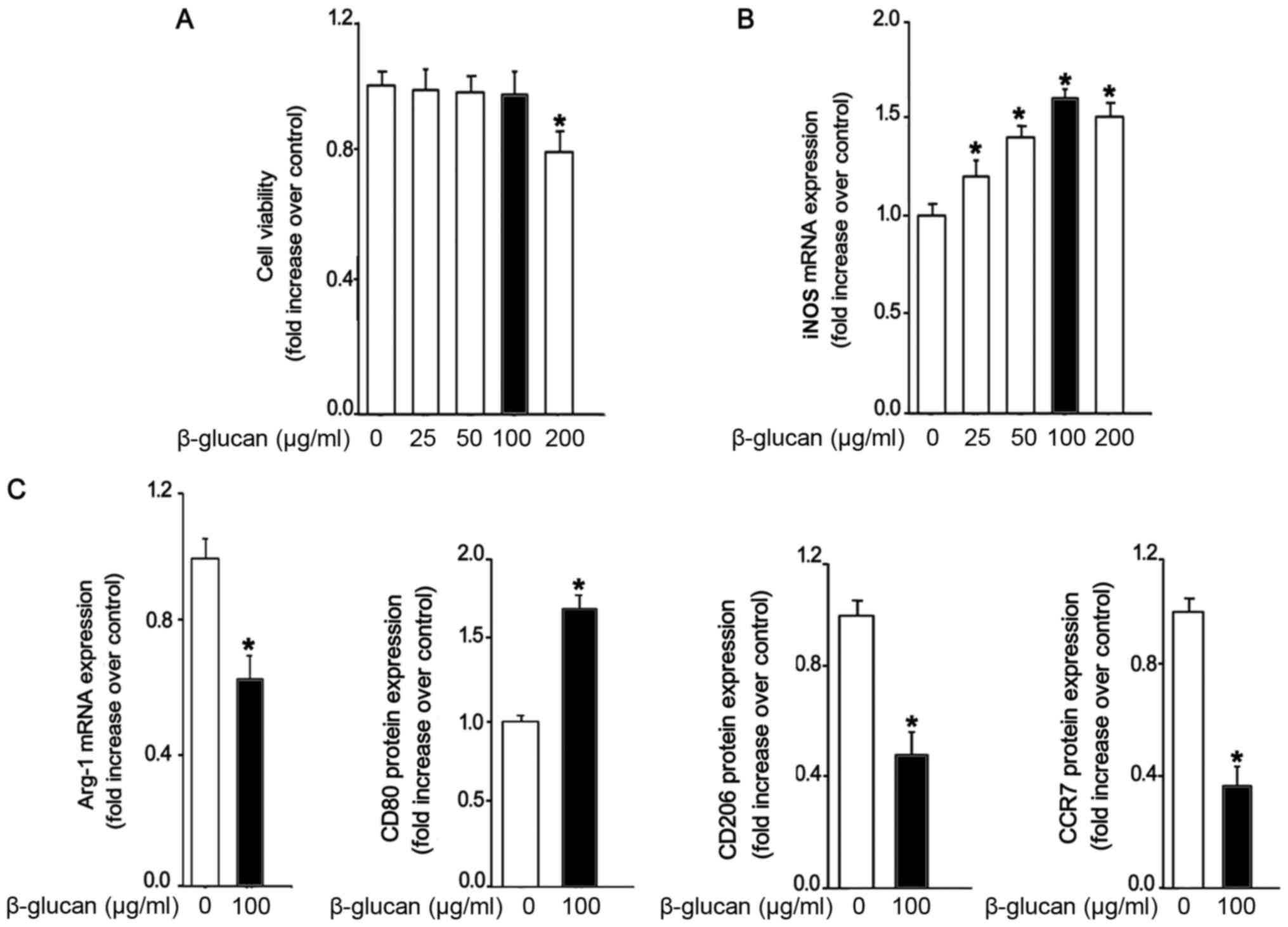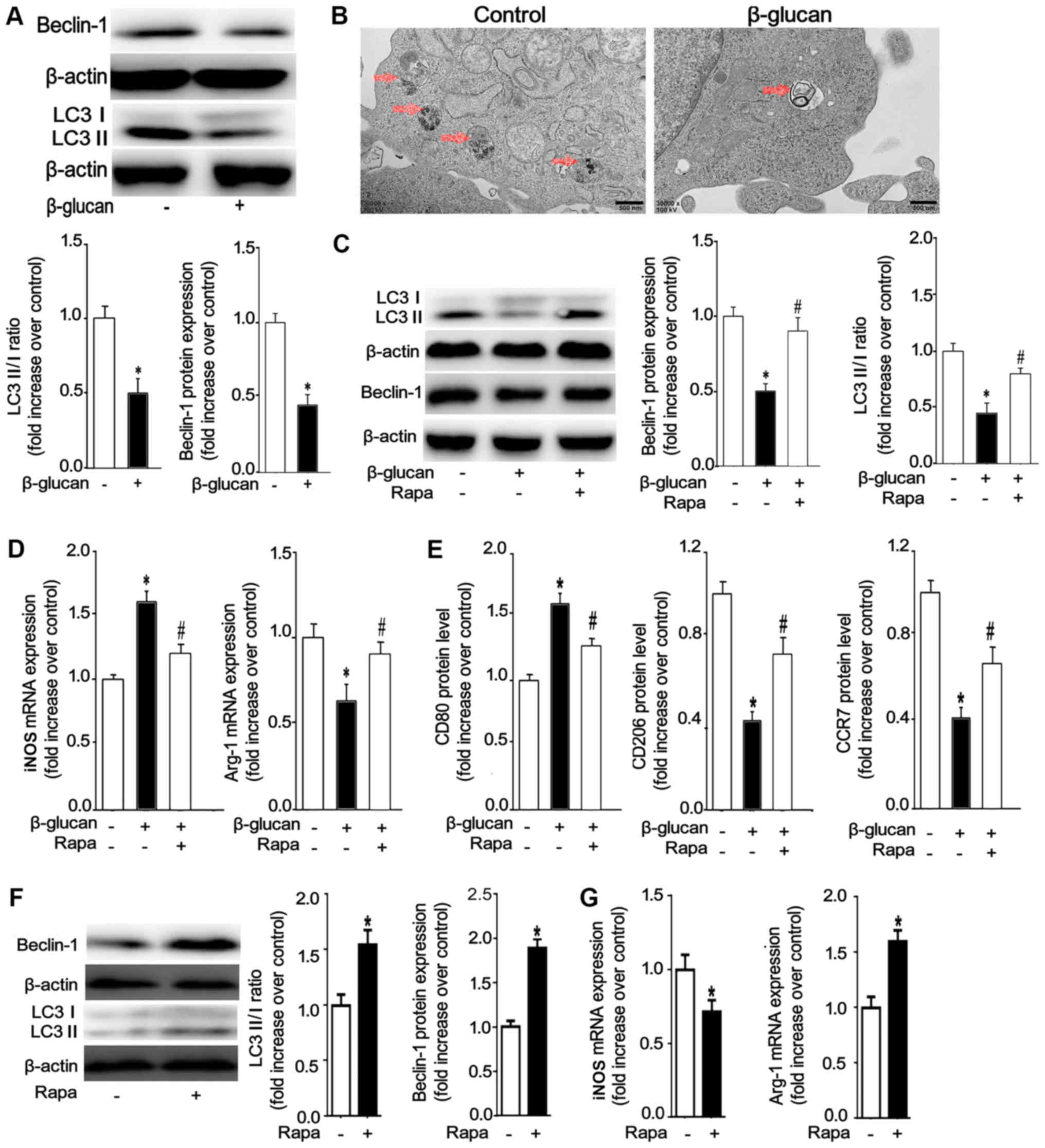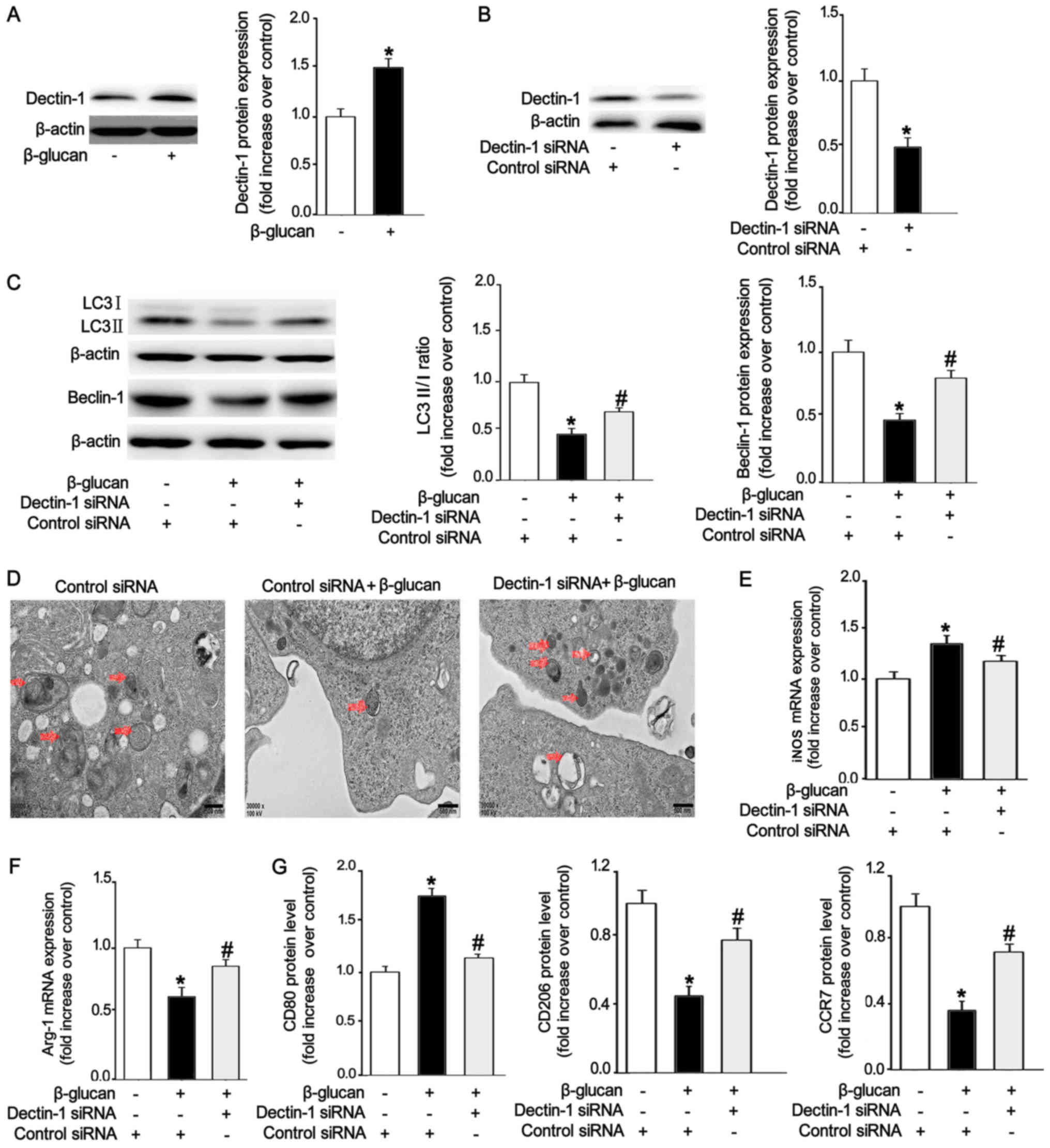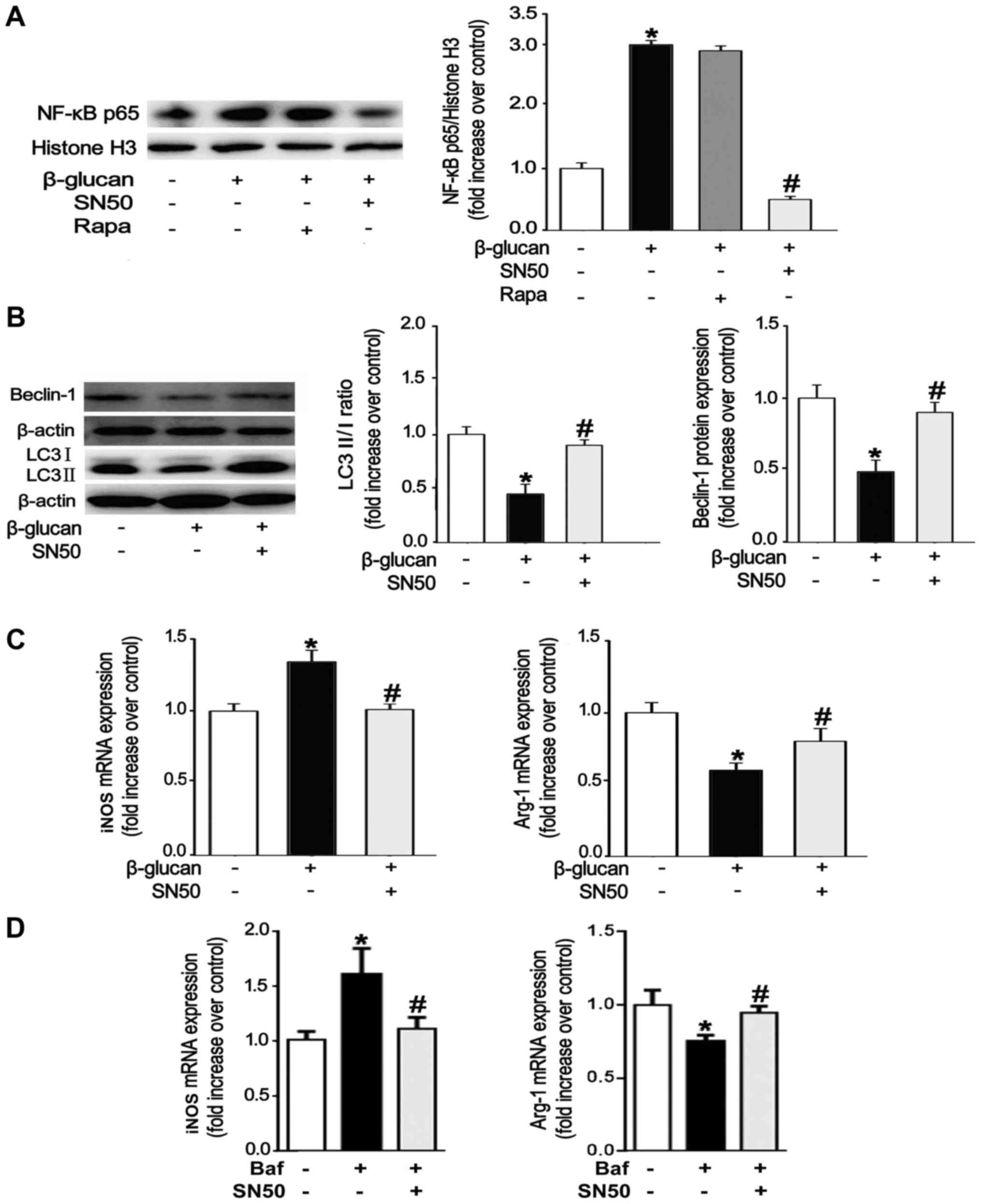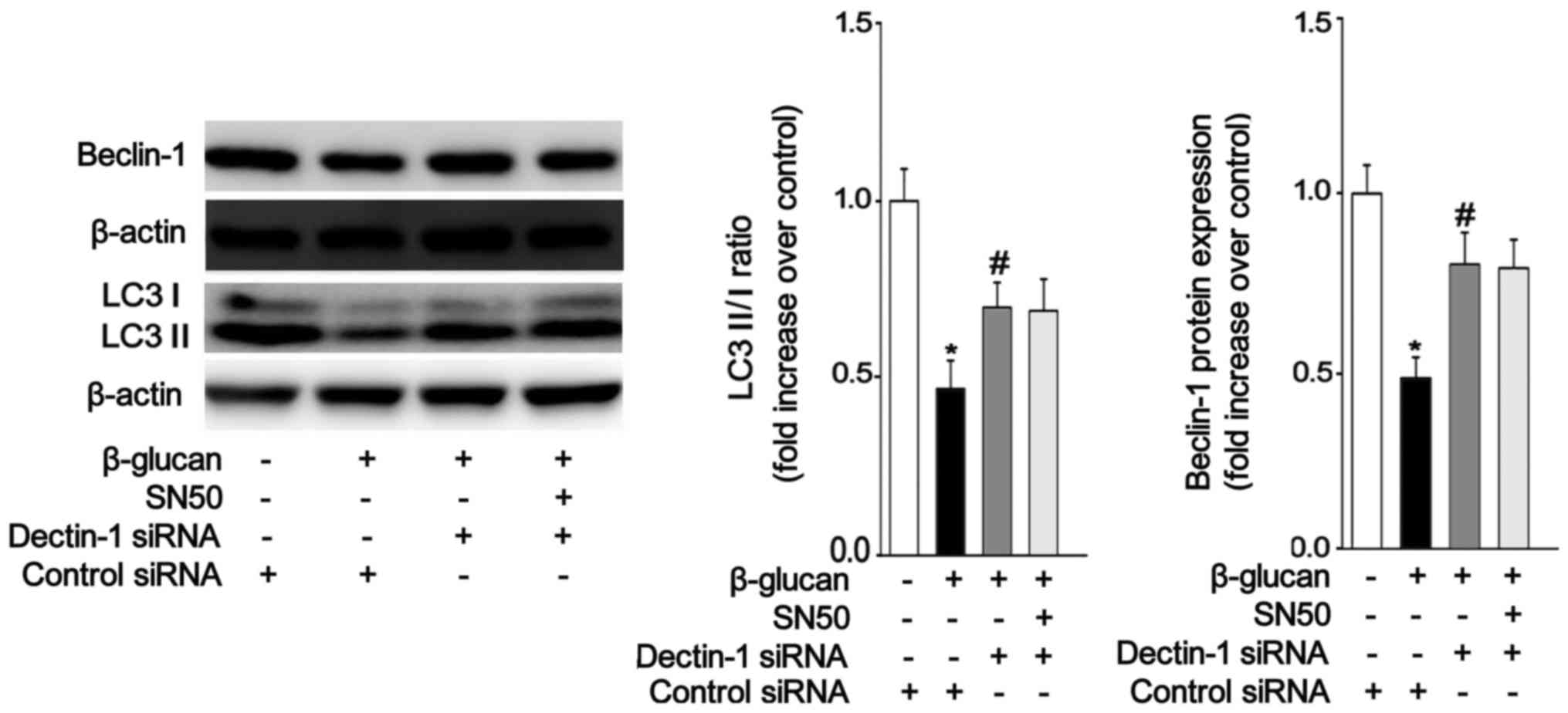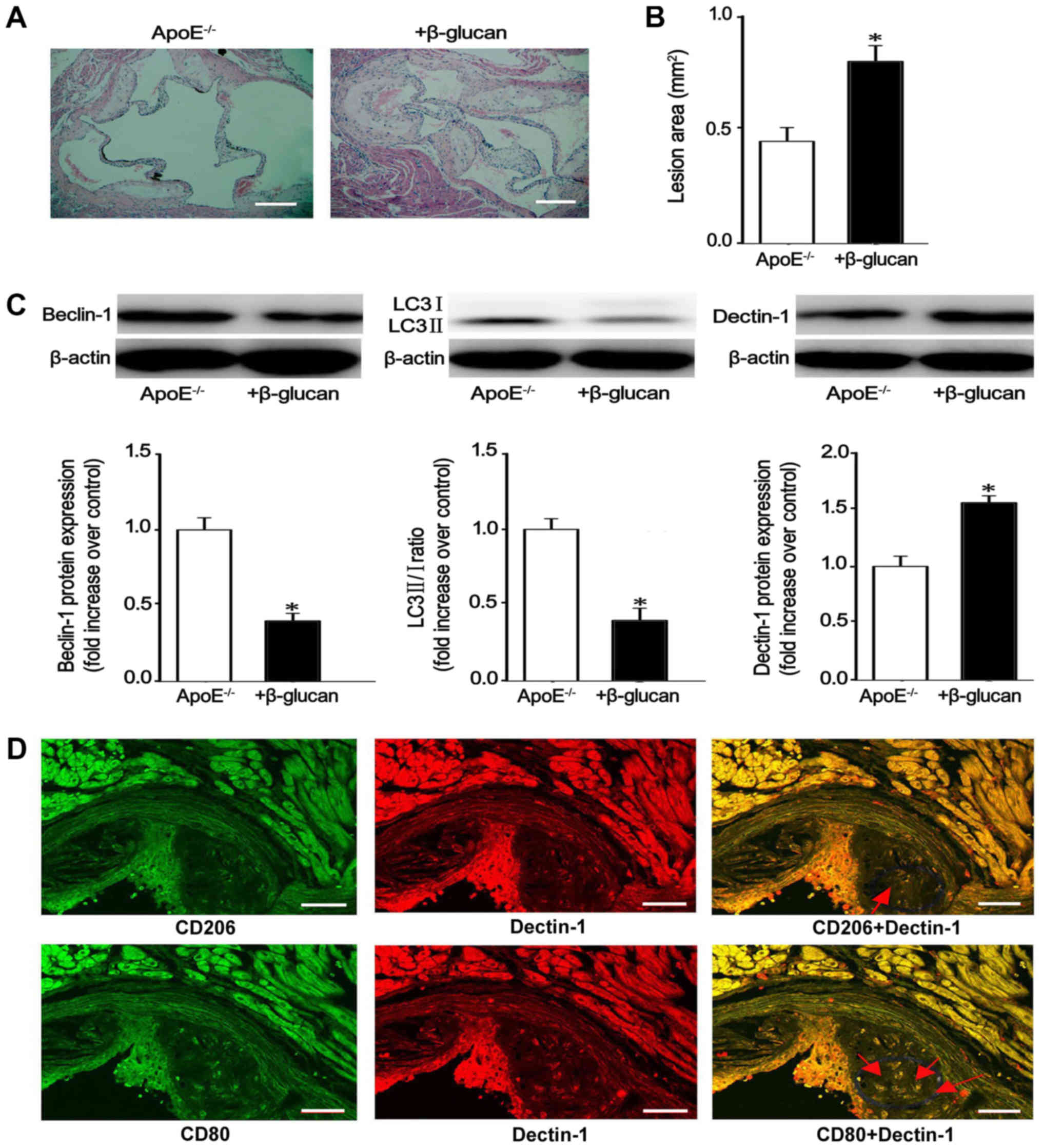|
1
|
Fernández-Velasco M, González-Ramos S and
Boscá L: Involvement of monocytes/macrophages as key factors in the
development and progression of cardiovascular diseases. Biochem J.
458:187–193. 2014. View Article : Google Scholar : PubMed/NCBI
|
|
2
|
Tabas I and Bornfeldt KE: Macrophage
Phenotype and Function in Different Stages of Atherosclerosis. Circ
Res. 118:653–667. 2016. View Article : Google Scholar : PubMed/NCBI
|
|
3
|
Xu R, Li C, Wu Y, Shen L, Ma J, Qian J and
Ge J: Role of KCa3.1 Channels in Macrophage Polarization and Its
Relevance in Atherosclerotic Plaque Instability. Arterioscler
Thromb Vasc Biol. 37:226–236. 2017. View Article : Google Scholar : PubMed/NCBI
|
|
4
|
Fang S, Xu Y, Zhang Y, Tian J, Li J, Li Z,
He Z, Chai R, Liu F, Zhang T, et al: Irgm1 promotes M1 but not M2
macrophage polarization in atherosclerosis pathogenesis and
development. Atherosclerosis. 251:282–290. 2016. View Article : Google Scholar : PubMed/NCBI
|
|
5
|
Colin S, Chinetti-Gbaguidi G and Staels B:
Macrophage phenotypes in atherosclerosis. Immunol Rev. 262:153–166.
2014. View Article : Google Scholar : PubMed/NCBI
|
|
6
|
McAlpine CS, Huang A, Emdin A, Banko NS,
Beriault DR, Shi Y and Werstuck GH: Deletion of myeloid GSK3α
attenuates atherosclerosis and promotes an M2 macrophage phenotype.
Arterioscler Thromb Vasc Biol. 35:1113–1122. 2015. View Article : Google Scholar : PubMed/NCBI
|
|
7
|
Peled M and Fisher EA: Dynamic aspects of
macrophage polarization during atherosclerosis progression and
regression. Front Immunol. 5:5792014. View Article : Google Scholar : PubMed/NCBI
|
|
8
|
Sergin I, Evans TD, Zhang X, Bhattacharya
S, Stokes CJ, Song E, Ali S, Dehestani B, Holloway KB, Micevych PS,
et al: Exploiting macrophage autophagy-lysosomal biogenesis as a
therapy for atherosclerosis. Nat Commun. 8:157502017. View Article : Google Scholar : PubMed/NCBI
|
|
9
|
Masuyama A, Mita T, Azuma K, Osonoi Y,
Nakajima K, Goto H, Nishida Y, Miyatsuka T, Mitsumata M and Watada
H: Defective autophagy in vascular smooth muscle cells enhances
athero-sclerotic plaque instability. Biochem Biophys Res Commun.
Oct 11–2018.Epub ahead of print. View Article : Google Scholar
|
|
10
|
Wang C, Xu W, Liang M, Huang D and Huang
K: CTRP13 inhibits atherosclerosis via autophagy-lysosome-dependent
degradation of CD36. FASEB J. Sep 17;2018Epub ahead of print.
|
|
11
|
Liao X, Sluimer JC, Wang Y, Subramanian M,
Brown K, Pattison JS, Robbins J, Martinez J and Tabas I: Macrophage
autophagy plays a protective role in advanced atherosclerosis. Cell
Metab. 15:545–553. 2012. View Article : Google Scholar : PubMed/NCBI
|
|
12
|
Dai S, Wang B, Li W, Wang L, Song X, Guo
C, Li Y, Liu F, Zhu F, Wang Q, et al: Systemic application of
3-methyladenine markedly inhibited atherosclerotic lesion in
ApoE-/- mice by modulating autophagy, foam cell formation and
immune-negative molecules. Cell Death Dis. 7:e24982016. View Article : Google Scholar
|
|
13
|
Kou JY, Li Y, Zhong ZY, Jiang YQ, Li XS,
Han XB, Liu ZN, Tian Y and Yang LM: Berberine-sonodynamic therapy
induces autophagy and lipid unloading in macrophage. Cell Death
Dis. 8:e25582017. View Article : Google Scholar : PubMed/NCBI
|
|
14
|
Martinet W, De Bie M, Schrijvers DM, De
Meyer GR, Herman AG and Kockx MM: 7-ketocholesterol induces protein
ubiquitination, myelin figure formation, and light chain 3
processing in vascular smooth muscle cells. Arterioscler Thromb
Vasc Biol. 24:2296–2301. 2004. View Article : Google Scholar : PubMed/NCBI
|
|
15
|
Martinet W and De Meyer GR: Autophagy in
atherosclerosis: A cell survival and death phenomenon with
therapeutic potential. Circ Res. 104:304–317. 2009. View Article : Google Scholar : PubMed/NCBI
|
|
16
|
Wang T, Zhang L, Hu J, Duan Y, Zhang M,
Lin J, Man W, Pan X, Jiang Z, Zhang G, et al: Mst1 participates in
the atherosclerosis progression through macrophage autophagy
inhibition and macrophage apoptosis enhancement. J Mol Cell
Cardiol. 98:108–116. 2016. View Article : Google Scholar : PubMed/NCBI
|
|
17
|
Chan GC, Chan WK and Sze DM: The effects
of beta-glucan on human immune and cancer cells. J Hematol Oncol.
2:252009. View Article : Google Scholar : PubMed/NCBI
|
|
18
|
Li X, Wang J, Wang W, Liu C, Sun S, Gu J,
Wang X, Boraschi D, Huang Y and Qu D: Immunomodulatory activity of
a novel, synthetic beta-glucan (β-glu6) in murine macrophages and
human peripheral blood mononuclear cells. PLoS One. 8:e803992013.
View Article : Google Scholar
|
|
19
|
Karumuthil-Melethil S, Gudi R, Johnson BM,
Perez N and Vasu C: Fungal β-glucan, a Dectin-1 ligand, promotes
protection from type 1 diabetes by inducing regulatory innate
immune response. J Immunol. 193:3308–3321. 2014. View Article : Google Scholar : PubMed/NCBI
|
|
20
|
Xu J, Liu D, Yin Q and Guo L: Tetrandrine
suppresses β glucan induced macrophage activation via inhibiting NF
κB, ERK and STAT3 signaling pathways. Mol Med Rep. 13:5177–5184.
2016. View Article : Google Scholar : PubMed/NCBI
|
|
21
|
Brown GD and Gordon S: Immune recognition.
A new receptor for beta-glucans Nature. 413:36–37. 2001.
|
|
22
|
Brown GD, Taylor PR, Reid DM, Willment JA,
Williams DL, Martinez-Pomares L, Wong SY and Gordon S: Dectin-1 is
a major beta-glucan receptor on macrophages. J Exp Med.
196:407–412. 2002. View Article : Google Scholar : PubMed/NCBI
|
|
23
|
Taylor PR, Tsoni SV, Willment JA, Dennehy
KM, Rosas M, Findon H, Haynes K, Steele C, Botto M, Gordon S, et
al: Dectin-1 is required for beta-glucan recognition and control of
fungal infection. Nat Immunol. 8:31–38. 2007. View Article : Google Scholar
|
|
24
|
Brown GD, Herre J, Williams DL, Willment
JA, Marshall AS and Gordon S: Dectin-1 mediates the biological
effects of beta-glucans. J Exp Med. 197:1119–1124. 2003. View Article : Google Scholar : PubMed/NCBI
|
|
25
|
Steele C, Marrero L, Swain S, Harmsen AG,
Zheng M, Brown GD, Gordon S, Shellito JE and Kolls JK: Alveolar
macrophage-mediated killing of Pneumocystis carinii fsp muris
involves molecular recognition by the Dectin-1 beta-glucan
receptor. J Exp Med. 198:1677–1688. 2003. View Article : Google Scholar : PubMed/NCBI
|
|
26
|
Gantner BN, Simmons RM, Canavera SJ, Akira
S and Underhill DM: Collaborative induction of inflammatory
responses by dectin-1 and Toll-like receptor 2. J Exp Med.
197:1107–1117. 2003. View Article : Google Scholar : PubMed/NCBI
|
|
27
|
Goodridge HS, Wolf AJ and Underhill DM:
Beta-glucan recognition by the innate immune system. Immunol Rev.
230:38–50. 2009. View Article : Google Scholar : PubMed/NCBI
|
|
28
|
Liu M, Luo F, Ding C, Albeituni S, Hu X,
Ma Y, Cai Y, McNally L, Sanders MA, Jain D, et al: Dectin-1
activation by a natural product β-glucan converts immunosuppressive
macrophages into an M1-like phenotype. J Immunol. 195:5055–5065.
2015. View Article : Google Scholar : PubMed/NCBI
|
|
29
|
Tam JM, Mansour MK, Khan NS, Seward M,
Puranam S, Tanne A, Sokolovska A, Becker CE, Acharya M, Baird MA,
et al: Dectin-1-dependent LC3 recruitment to phagosomes enhances
fungicidal activity in macrophages. J Infect Dis. 210:1844–1854.
2014. View Article : Google Scholar : PubMed/NCBI
|
|
30
|
Öhman T, Teirilä L, Lahesmaa-Korpinen AM,
Cypryk W, Veckman V, Saijo S, Wolff H, Hautaniemi S, Nyman TA and
Matikainen S: Dectin-1 pathway activates robust autophagy-dependent
unconventional protein secretion in human macrophages. J Immunol.
192:5952–5962. 2014. View Article : Google Scholar : PubMed/NCBI
|
|
31
|
Li X, Zhou Y, Yu C, Yang H, Zhang C, Ye Y
and Xiao S: Paeonol suppresses lipid accumulation in macrophages
via upregulation of the ATP binding cassette transporter A1 and
downregulation of the cluster of differentiation 36. Int J Oncol.
46:764–774. 2015. View Article : Google Scholar
|
|
32
|
Jang CW, Shibata Y, Starmer J, Yee D and
Magnuson T: Histone H3.3 maintains genome integrity during
mammalian development. Genes Dev. 29:1377–1392. 2015. View Article : Google Scholar : PubMed/NCBI
|
|
33
|
Livak KJ and Schmittgen TD: Analysis of
relative gene expression data using real-time quantitative PCR and
the 2(-Delta Delta C(T)) method. Methods. 25:402–408. 2001.
View Article : Google Scholar
|
|
34
|
Deng X, Zhang J, Liu Y, Chen L and Yu C:
TNF-α regulates the proteolytic degradation of ST6Gal-1 and
endothelial cell-cell junctions through upregulating expression of
BACE1. Sci Rep. 7:402562017. View Article : Google Scholar
|
|
35
|
Wang Y, Li Y, Li H, Song H, Zhai N, Lou L,
Wang F, Zhang K, Bao W, Jin X, et al: Brucella Dysregulates
Monocytes and Inhibits Macrophage Polarization through
LC3-Dependent Autophagy. Front Immunol. 8:6912017. View Article : Google Scholar :
|
|
36
|
Zhang Y, Morgan MJ, Chen K, Choksi S and
Liu ZG: Induction of autophagy is essential for monocyte-macrophage
differentiation. Blood. 119:2895–2905. 2012. View Article : Google Scholar : PubMed/NCBI
|
|
37
|
Vannucci L, Krizan J, Sima P, Stakheev D,
Caja F, Rajsiglova L, Horak V and Saieh M: Immunostimulatory
properties and antitumor activities of glucans (Review). Int J
Oncol. 43:357–364. 2013. View Article : Google Scholar : PubMed/NCBI
|
|
38
|
Chang CF, Liao KC and Chen CH:
2-Phenylnaphthalene Derivatives Inhibit Lipopolysaccharide-Induced
Pro-Inflammatory Mediators by Downregulating of MAPK/NF-κB Pathways
in RAW 264.7 Macrophage Cells. PLoS One. 12:e01689452017.
View Article : Google Scholar
|
|
39
|
Chian CF, Chiang CH, Chuang CH, Liu SL and
Tsai CL: SN50, a Cell-Permeable Inhibitor of Nuclear Factor-κB,
Attenuates Ventilator-Induced Lung Injury in an Isolated and
Perfused Rat Lung Model. Shock. 46:194–201. 2016. View Article : Google Scholar : PubMed/NCBI
|
|
40
|
Kanarek N and Ben-Neriah Y: Regulation of
NF-κB by ubiquitination and degradation of the IκBs. Immunol Rev.
246:77–94. 2012. View Article : Google Scholar : PubMed/NCBI
|
|
41
|
Hou X, Xiao H, Zhang Y, Zeng X, Huang M,
Chen X, Birnbaumer L and Liao Y: Transient receptor potential
channel 6 knockdown prevents apoptosis of renal tubular epithelial
cells upon oxidative stress via autophagy activation. Cell Death
Dis. 9:10152018. View Article : Google Scholar : PubMed/NCBI
|
|
42
|
Kirbis S, Breskvar UD, Sabovic M, Zupan I
and Sinkovic A: Inflammation markers in patients with coronary
artery disease - comparison of intracoronary and systemic levels.
Wien Klin Wochenschr. 122(Suppl 2): 31–34. 2010. View Article : Google Scholar
|
|
43
|
Jetten N, Verbruggen S, Gijbels MJ, Post
MJ, De Winther MP and Donners MM: Anti-inflammatory M2, but not
pro-inflammatory M1 macrophages promote angiogenesis in vivo.
Angiogenesis. 17:109–118. 2014. View Article : Google Scholar
|
|
44
|
Lee CG, Homer RJ, Zhu Z, Lanone S, Wang X,
Koteliansky V, Shipley JM, Gotwals P, Noble P, Chen Q, et al:
Interleukin-13 induces tissue fibrosis by selectively stimulating
and activating transforming growth factor beta(1). J Exp Med.
194:809–821. 2001. View Article : Google Scholar : PubMed/NCBI
|
|
45
|
Sierra-Filardi E, Vega MA, Sánchez-Mateos
P, Corbí AL and Puig-Kröger A: Heme Oxygenase-1 expression in
M-CSF-polarized M2 macrophages contributes to LPS-induced IL-10
release. Immunobiology. 215:788–795. 2010. View Article : Google Scholar : PubMed/NCBI
|
|
46
|
Harris J: Autophagy and cytokines.
Cytokine. 56:140–144. 2011. View Article : Google Scholar : PubMed/NCBI
|
|
47
|
Moore KJ and Tabas I: Macrophages in the
pathogenesis of atherosclerosis. Cell. 145:341–355. 2011.
View Article : Google Scholar : PubMed/NCBI
|
|
48
|
Murray PJ and Wynn TA: Protective and
pathogenic functions of macrophage subsets. Nat Rev Immunol.
11:723–737. 2011. View Article : Google Scholar : PubMed/NCBI
|
|
49
|
Zhang Y and Ren J: Epigenetics and obesity
cardiomyopathy: From pathophysiology to prevention and management.
Pharmacol Ther. 161:52–66. 2016. View Article : Google Scholar : PubMed/NCBI
|
|
50
|
Zhang Y, Xu X and Ren J: MTOR
overactivation and interrupted autophagy flux in obese hearts: A
dicey assembly? Autophagy. 9:939–941. 2013. View Article : Google Scholar : PubMed/NCBI
|
|
51
|
Razani B, Feng C, Coleman T, Emanuel R,
Wen H, Hwang S, Ting JP, Virgin HW, Kastan MB and Semenkovich CF:
Autophagy links inflammasomes to atherosclerotic progression. Cell
Metab. 15:534–544. 2012. View Article : Google Scholar : PubMed/NCBI
|
|
52
|
Verheye S, Martinet W, Kockx MM, Knaapen
MW, Salu K, Timmermans JP, Ellis JT, Kilpatrick DL and De Meyer GR:
Selective clearance of macrophages in atherosclerotic plaques by
autophagy. J Am Coll Cardiol. 49:706–715. 2007. View Article : Google Scholar : PubMed/NCBI
|
|
53
|
Baldwin AS: Regulation of cell death and
autophagy by IKK and NF-κB: Critical mechanisms in immune function
and cancer. Immunol Rev. 246:327–345. 2012. View Article : Google Scholar : PubMed/NCBI
|
|
54
|
Lim MK, Ku SK, Choi JS and Kim JW: Effect
of polycan, a β-glucan originating from Aureobasidium, on a
high-fat diet-induced hyperlipemic hamster model. Exp Ther Med.
9:1369–1378. 2015. View Article : Google Scholar : PubMed/NCBI
|















